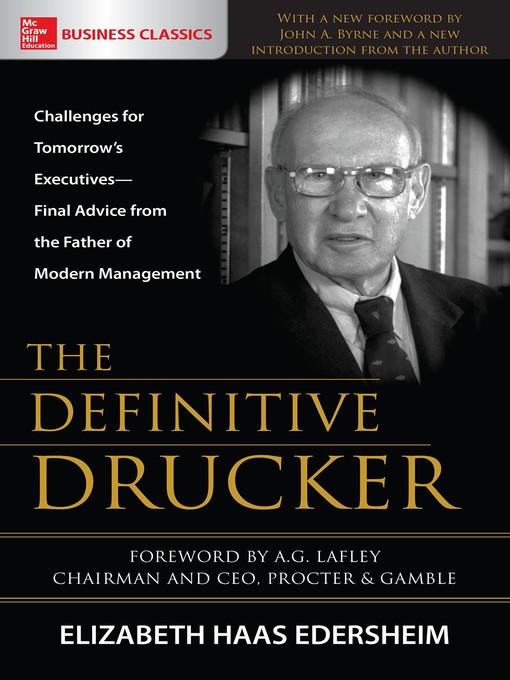
The Definitive Drucker
Challenges For Tomorrow's Executives — Final Advice From the Father of Modern Management
کتاب های مرتبط
- اطلاعات
- نقد و بررسی
- دیدگاه کاربران
نقد و بررسی

December 11, 2006
In a concise introduction to the philosophy of the 20th century's most
\t\t distinguished business theoretician, Edersheim explores the insights that have
\t\t shaped management thinking from the 1940s through the 1990s. Drucker himself
\t\t chose Edersheim to interview him, based on her previous book (McKinsey's Marvin Bower, about the man who built the
\t\t global consulting firm McKinsey & Company), but he had in mind a biography
\t\t of his ideas, not a traditional bio. Edersheim blends brief summaries of
\t\t Drucker's thinking on various management topics (innovation, customers,
\t\t leadership, decision making) with examples of how his ideas have been practiced
\t\t at specific organizations and comments from contemporary business leaders. She
\t\t doesn't try to trace the development of Drucker's ideas over time; instead, she
\t\t focuses on the challenges managers face today and tries to cull useful advice
\t\t for tackling them from Drucker's writings. Those seeking a broad intellectual
\t\t and social context for Drucker's work might prefer Jack Beatty's 1998
\t\t The World According to Peter Drucker, while
\t\t aspiring managers should turn instead to one of Drucker's own books, whose
\t\t intellectual rigor and lively prose make them immensely readable to this day.
\t\t

December 1, 2006
Often called the father of modern management, Peter F. Drucker (19092005) is a name that carries weight in the business world. Strategic consultant Edersheim here applies Drucker's body of work, clarified by extensive interviews with the man himself and many of the top executives whom he influenced (e.g., Jack Welch), to 21st-century business. She takes "Druckerian" questions and quotations and conducts her own analysis, often pulling current examples from her own client base. Despite extensive citations, sorting out the authorial voice can be a bit difficult, particularly when Edersheim uses her interviews with Drucker as validation of her own insights. But her questions are logical, and her conclusions are sound. The end result is a clear and readable update to Drucker's business philosophies. Recommended for most libraries.Brian Walton, Rolling Meadows Lib., IL
Copyright 2006 Library Journal, LLC Used with permission.

February 15, 2007
Austrian-born Peter Drucker (1909-2005) was regarded as the founding father of modern business management. He wrote a total of 39 books on management, economics, and politics, and counseled the heads of GM, Ford, and GE as well as numerous political leaders including Margaret Thatcher and Presidents Eisenhower and Kennedy. This may be considered his final collaborative work, as it contains information Edersheim obtained through interviews during the last six months of his life. Rather than producing an exhaustive biography, Edersheim chose to focus on the man's thoughts and ideas--reflections on his methods and views on the challenges of today's business management. Some of these are classic Drucker, such as viewing your business from the customer's prospective, the importance of collaboration and of taking care of the people in your organization. Other thoughts are very forward thinking, as Drucker muses on the influence of technology and the Internet. With the addition of numerous quotations, both by and about Drucker, Edersheim has captured the essence of the man and his works.(Reprinted with permission of Booklist, copyright 2007, American Library Association.)

























دیدگاه کاربران